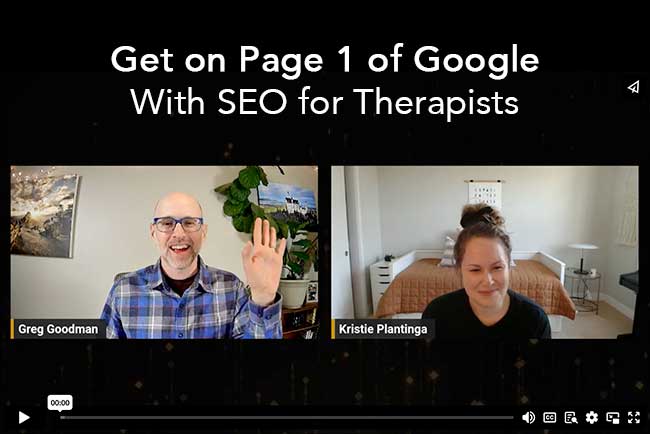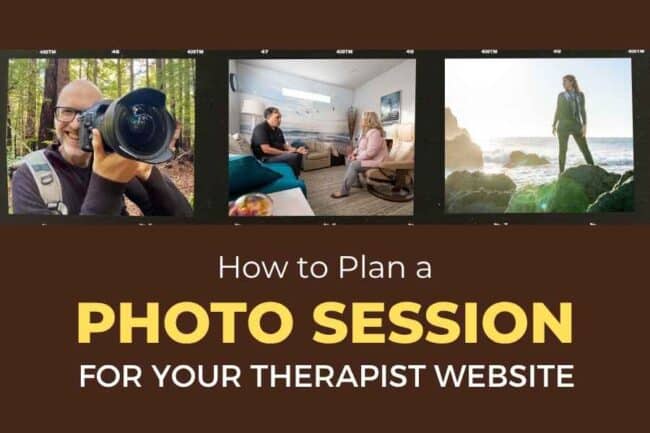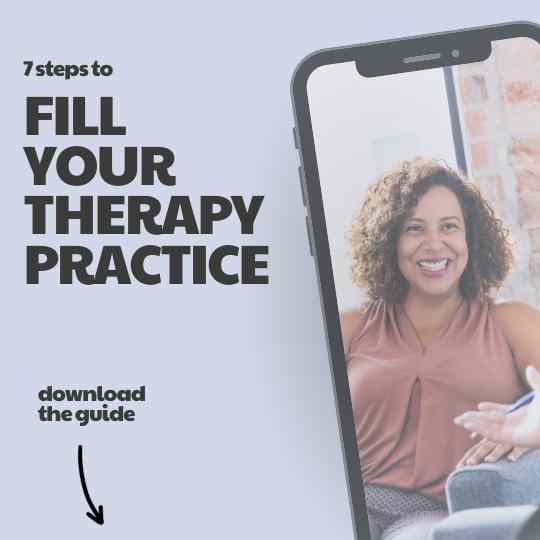Why do some Therapists show up on page 1 of Google while your practice is hidden on page 101?
How can you get a steady flow of clients without paying for ads?
What is the meaning of life?
I can help you answer 2/3 of those questions with one video about Search Engine Optimization (SEO) for therapists. Keep scrolling for an in-depth training: presented by Kristie Plantinga – founder of TherapieSEO. In this one-hour video, Kristie covers:
- What is SEO and how does it work?
- How to do SEO for Free
- Where to find the best keywords for your website.
- How to write copy that appeals to clients and Google.
- How to optimize your website for SEO
- How to get your website on Page 1 of Google
- Why you can’t get on Page 1 overnight
- Why it’s getting tougher than ever to do therapist SEO.
What is Search Engine Optimization (SEO)?
In today’s digital world, making sure your therapy practice is visible online is crucial. Don’t worry if terms like “SEO” or “meta tags” sound like a foreign language right now. I’m here to help you understand and implement SEO for Therapists step by step, even if you’re starting from scratch. So, grab a cup of tea, and let’s embark on this journey to boost your online presence and fill your caseload.
Why is SEO Vital for Therapists
You’ve spent years studying, practicing, putting in your supervision hours, passing your exams, and serving clients But, no matter how hard you try, your caseload isn’t full. That’s where SEO comes into play. Think of it as the secret sauce to make sure your practice doesn’t go unnoticed.
Meet Sarah, a potential client in your area who’s dealing with anxiety. She pulls out her smartphone, opens up Google, and types, “anxiety therapist near me.” If your website is well-optimized, Sarah is more likely to discover your practice. Let’s dig deeper into why SEO is so important:
- Visibility and Trustworthiness: SEO helps your website appear higher in search results, making potential clients more likely to trust and choose your services.
- Cost-Effective Marketing: Unlike paid advertising, SEO is a long-term strategy that keeps working for you without breaking the bank.
- Reaching the Right Audience: By optimizing for specific keywords related to your therapy services, you attract people actively searching for help.
- Standing Out: In a competitive field, SEO can help you stand out and showcase your unique approach to therapy.
DIY SEO Tips for Therapists
Let’s start with the basics and explore actionable steps to improve your therapist website’s SEO:
- Mastering Meta Tags: Think of meta titles and descriptions as the introduction to your website. Craft clear and engaging descriptions for each page. These descriptions help search engines understand what your page is about, and they’re the first thing users see in search results.
- Keyword Optimization: Keywords are the words and phrases people type into search engines when looking for therapists. Use tools like Google’s Keyword Planner to find keywords related to your services. Then, naturally incorporate them into your website’s content.
- Mobile-Friendly Design: Given that many people use smartphones to browse the web, it’s vital that your website is mobile-friendly. This means it should look and work well on mobile devices, like phones and tablets.
- Speed Matters: Website speed is crucial. Slow-loading pages can frustrate visitors and hurt your SEO. Use tools like Google PageSpeed Insights to identify and fix speed issues.
- Quality Content: Develop informative and engaging content that answers common questions and concerns your clients have. Regularly publish blog posts or articles showcasing your expertise.
Tools and Apps for SEO
Let’s explore some helpful tools and applications to make your SEO journey smoother:
- Google Analytics: This free tool helps you track website traffic. It’s like having a therapist for your website, providing insights into who’s visiting your site and what they’re doing.
- Google Search Console: Think of it as a health checkup for your website. It helps you identify and address issues that could affect your site’s performance.
- SEO Plugins: If your therapist website is built with WordPress, consider installing plugins like Yoast SEO or All in One SEO Pack. They provide guidance on optimizing your content, including those meta tags we mentioned earlier.
- Keyword Research Tools: Dive deep into keyword research using tools like SEMrush, Ahrefs, or Moz. These tools help you discover keyword ideas, analyze your competition, and refine your content strategy.
- Social Media Schedulers: To effectively promote your content, consider using social media scheduling tools like Buffer or Hootsuite. They allow you to schedule posts and engage with your audience on various platforms.
How to Conduct Keyword Research
Keyword research is the foundation of your SEO strategy. Here’s how to do it step by step:
- Identify Your Focus: Begin by understanding your therapy specialties. What types of clients are you looking to attract?
- Generate Keyword Ideas: Brainstorm keywords related to your services. For example, if you specialize in anxiety therapy, think of terms like “anxiety counseling” or “anxiety treatment.”
- Keyword Tools: Use keyword research tools like Google’s Keyword Planner or Ubersuggest. Simply enter your keyword ideas, and these tools will show you search volumes, competition levels, and related terms.
- Check in on Competitors: Take a look at the websites of other therapists in your area. What keywords are they targeting? Are there any gaps you can fill with your content?
- Create Valuable Content: Based on your keyword research, create high-quality, informative content. This could include blog posts, service pages, or frequently asked questions (FAQs).
- Monitor and Adjust: Keep an eye on your keyword rankings and website traffic. Adjust your strategy based on performance and emerging trends.
Realistic Expectations: How Long Does Therapist SEO Take?
Let’s talk about patience. SEO isn’t a quick fix; it’s a long-term investment. Here’s what you should know:
- Timeline: SEO takes time to show significant results. Don’t expect instant success. It can take 8-12 months to see substantial improvements in rankings and website traffic. You can learn more about how long SEO takes here.
- Consistency is Key: Consistently publishing quality content, optimizing your website, and building backlinks are all part of the SEO journey. These efforts accumulate over time and yield better results.
- Competition Matters: The level of competition in your area and niche can influence how quickly you see results. In highly competitive markets, it may take more time and effort to rise through the ranks.
Do you need more clients?
Are you a therapist who wants to:
- Grow your practice
- Work with clients you love
- Get more private pay clients
- Build a foundation for success
Need a new website?
I have two slots available.
If you are ready for a therapist marketing expert with 2 decades of experience to hold your hand and walk you through the entire process, reach out today.
If you want a beautiful, custom website that speaks directly to your dream client and inspires them to reach out, we should talk.
If you want a full practice … and maybe even a few associates … let’s chat.
Here are a few samples of websites I’ve just launched:
Want to learn more? Schedule a free clarity call here.
Or, fill out this form and let me know what you need.
















